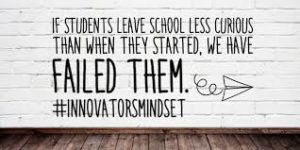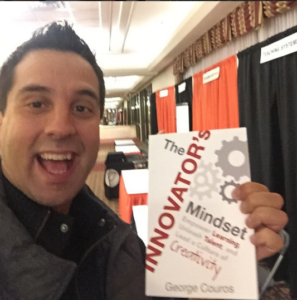This week educators around that world began the Innovator’ Mindset MOOC #IMMOOC. To join the conversation, check out IMMOOC.Org, #IMMOOC on Twitter or join us on Facebook.

In the Innovator’s Mindset. George Couros argues that, “If students leave school less curious than when they started, we have failed them.” To delve into this idea and think about what this means for us as educators, participants in the #IMMOOC read the introduction to the Innovator’s Mindset. Many tuned in to the show and throughout the week have shared their thoughts in blog posts and video reflections on Twitter, Facebook, and many other venues to answer the following questions:
- What is the purpose of education?
- Is innovation necessary in education?
- How are you embracing change to spur innovation in your own context?
Here are some highlights from the week so far.
Defining the purpose of education is not as easy as you might think. Many people’s different experiences and beliefs impact their thoughts on the purpose of education and how they believe that others should learn in school. Chevin Stone argues that, “The purpose of education goes beyond knowing the 3 R’s -being “educated” involves having a curiosity about the world around you and wanting to learn about that world. In the 20th century, it was all about simply preparing the community to function in a society that was created for them, where they/we were assigned particular roles…The purpose of education now is much different. The basics are still important; however, the world in which the children we teach are moving into as adults isn’t full of those industrial factory jobs anymore. We’re preparing them for jobs that actually don’t even exist yet (or so people say).”
Building on this notion, Kevin Hodgson shared examples of how kids are already learning to do many things on YouTube and through a variety of resources they have access to. He pushes us to think about how we might impact learners and their trajectories in life if we thought about teaching skills to be better learners, not just what to learn.
- What if we did a better job teaching the following skills?
- Search Engine Queries (and Search Engine Differences … Not Everything Starts and Ends with Google)
-
How Algorithms Shape Our Internet Experience (and How to Navigate Technological Bias)
-
Media Editing Techniques
-
Curation of Digital Content
-
How to Build an Audience
-
How to Ensure a Positive Digital Footprint
-
(Dare I say it) How to Make a Living off YouTube
This is a great list and there are many other relevant skills that I am sure you could add. How might this change in a year, 5 years, 10 years? How do you see the role of the teachers and how might this continue to evolve? There will be a lot more opportunities to explore this in Part 1 and I am looking forward to your thoughts:).
So, what is innovation in education and why is it necessary?
One of the biggest AHAs throughout the week that was shared in many tweets and blog posts was around the notion of what constitutes innovation. Nathan James summed up many of the groups’ thoughts:
I too, have often associated innovation and innovators with amazing new technology, systems, designs and ideas created by brilliant minds. In reality, as was pointed out by George Couros, “all teachers are innovators, but need to figure out how to best serve the needs of their students.” Learning also needs to continue with and for our administrators, superintendents, and boards. In his book, The Innovator’s Mindset Empower Learning, Unleash Talent, and Lead a Culture of Creativity, George Couros says, “if education’s leaders refuse to evaluate and stay in touch with students’ needs, our institutions will fail, just like businesses that don’t keep up with changing customers’ needs”.
Karen Szymusiak Expanded on this with some examples of how she views innovation in education.
- The learning environment can be an innovation in itself. Going beyond the desks-in-rows mentality.
- Relationships are critical to innovation….When teachers and students feel valued and trusted they take the risks that move them towards their goals. With strong relationships in place we can venture out from our comfort zones to be creative, curious, and passionate.
-
I think the biggest innovation we can make in our schools is to break down the hierarchy of learners. A school where everyone is a learner who drives their own learning. I believe that everyone in school learns alongside each other. We are all on a journey.
So what does this mean for educators today if our own experiences and preparation did not prepare us for this type of teaching and learning? Well, to start we have to acknowledge that things are changing and Mandy Lybeck reminds us that 10 years ago…
- Facebook and YouTube hadn’t launched
- iPads and tablets were still FOUR years from being released
- MySpace was the most popular social networking site
- Google Drive didn’t launch until 6 years AFTER
- Twitter first unveiled its PLN goodness 7 years AFTER (::gasp::)
To evolve with the tools and resources that exist in our world today requires teachers to always be learners too. Many teachers have adopted the mindset of lifelong learners and embrace changes and continually learn and grow and Megan Gordon describes her shift in thinking about what it means to be a teacher.
I used to think that all the REAL teachers had these systems that they created over time so that eventually, they didn’t really have to do much. It was like a rite of passage to signify a REAL teacher. And I was hoping that someday I would be good enough to be in that spot. Wow. Wrong. A real teacher is constantly changing, giving up, and adding in. Not for the sake of change, mind you, but for the betterment of learning.
As the world changes (rapidly) we must develop new and better approaches to educate the learners in our schools. Eric Rodriguez encourages us to think about how our students see us as learners and what we model. “Actions speak louder than words, and believe me our students listen with their eyes so much more than with their ears. How can we expect our students to take a chance if we never do?”
In Lorrah Hogue’s reflection she describes how she began with small shifts.
What I found was that I didn’t need to be the expert in the room. My 3rd graders were incredibly adept at learning the technology, often teaching me things that I wasn’t aware existed. They needed my guidance in collaborating and communicating effectively throughout the process. Taking myself off of the “stage” at the front of the room, and putting the kids in the driver’s seat made it possible for me to facilitate deeper discussions and encourage them to question and problem solve. Before I knew it, my students were teaching other teachers on campus how to get their students collaborating using GAFE!…Embracing change can lead to innovative experiences for our students! We can’t expect to keep doing the same old things, when the world is changing so dramatically. Start small, but START!
If we want to better align our schools with the world we live in, we must address these tough questions and continue to engage diverse stakeholders in these conversations. It is my hope that as we learn from this network, we continue to have more conversations and seek to better understand the needs of the learners in our unique communities to make local impact, and then keep sharing and improving.
To do this, we must remember that students are not the only learners in our buildings. Innovation is not something we can mandate our teachers (or anyone) to do. A final highlight this week comes from Scott Ringkamp, who reframed George’s statement,
“If students teachers leave school less curious than when they started, we have failed them.”
Yes, teachers are curious too. Teachers love to do fun and exciting things in the classroom. We ask our teachers to innovate, differentiate, and create awesome learning experiences for our students. But do we provide our teachers with awesome learning experiences? Can they take risks? Exercise curiosity? For a lot of teachers, they can’t. Instead, we see experienced teachers not willing to try new things. Not interested in innovating. Reinforced by boring, non-relevant professional development experiences that have been reduced to listening to someone talk for hours on end. Perhaps this lack of curiosity is because, just like our students, we have squeezed it right out of them.
Thanks to all the amazing educators who have taken steps this week to move beyond your comfort zone, to share your thinking, questions and ideas to make an impact on the others in the #IMMOOC (and hopefully beyond)! I couldn’t agree more with Lorrah, it’s ok to start small, but you have to take the first step. Looking forward to seeing the learning and innovative thinking that is shared as we continue to move forward in the Innovator’s Mindset MOOC.
Best,
Katie



